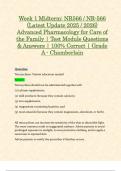Week 1 Midterm: NR566 / NR-566
(Latest Update )
Advanced Pharmacology for Care of
the Family | Test Module Questions
& Answers | 100% Correct | Grade
A - Chamberlain
Question:
Tetracyclines- Patient education needed
Answer:
Tetracyclines should not be administered together with
(1) calcium supplements,
(2) milk products (because they contain calcium),
(3) iron supplements,
(4) magnesium-containing laxatives, and
(5) most antacids (because they contain magnesium, aluminum, or both).
All tetracyclines can increase the sensitivity of the skin to ultraviolet light.
The most common result is exaggerated sunburn. Advise patients to avoid
prolonged exposure to sunlight, to wear protective clothing, and to apply a
sunscreen to exposed skin.
Advise patients to notify the prescriber if diarrhea occurs.
, Question:
Tetracyclines- Prescribing in pregnant patients
Answer:
When taken after the fourth month of gestation, tetracyclines can cause
staining of deciduous teeth of the infant.
Tetracyclines taken by a pregnant woman can suppress the growth of long
bones in premature infants. This effect is reversible on discontinuation of
treatment.
Animal studies reveal that tetracyclines can cause fetal harm in pregnancy.
Thus this class of drugs should be avoided in pregnant women.
Question:
Macrolides- Patient education needed
Answer:
Gastrointestinal disturbances (epigastric pain, nausea, vomiting, diarrhea) are
the most common side effects. These can be reduced by administering
erythromycin with meals.
Can cause QT prolongation and sudden cardiac death
To minimize risk, erythromycin should be avoided by patients with congenital
QT prolongation and by those taking class IA or III antidysrhythmic drugs.
Also, the drug should be avoided by patients taking CYP3A4 inhibitors,
including certain calcium channel blockers (verapamil and diltiazem), azole
antifungal drugs (e.g., ketoconazole, itraconazole), HIV protease inhibitors
(e.g., ritonavir, saquinavir), and nefazodone (an antidepressant).




